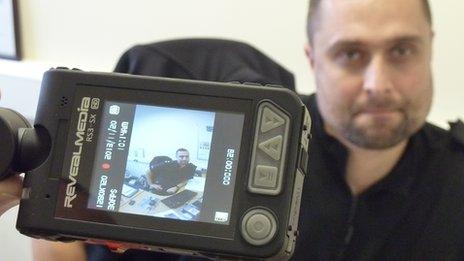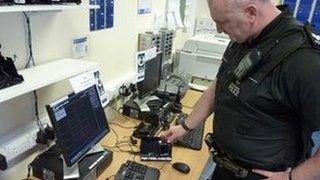Body Cameras: Surveillance for surveillance's sake?
- Published

About 1,100 police officers in Staffordshire have been issued with body cameras
Body cameras are becoming widely used by police across the UK but now the technology is being adopted by local councils. The authorities claim they are vital for traffic wardens and environmental officers but critics claim body cams are "surveillance for surveillance's sake" and are being used as a money making tool.
Sgt John Bloore is one of the first of 1,100 police officers to be issued with the cameras in Staffordshire at a cost of more than £350,000.
Staffordshire Police says it will see all frontline officers, PCSOs and specials issued with them and claims it is the biggest investment in the technology by any police force in Europe.
Sgt Bloore has filmed footage at domestic violence incidents, road traffic accidents and fights outside pubs and nightclubs which has been used to prosecute people.
"Writing a report doesn't have the same impact as the pictures because the camera doesn't lie," he said.
"It basically sees what we see but instead of having to remember we can rewind it to see it over and over again."
The footage is held on a database for a minimum of 28 days and can be submitted to court as evidence.
'Abuse and threats'
Sgt Bloore said it often does not get to that stage.
"When people know there's footage of whatever has taken place we get a straightforward guilty plea because they can see themselves on the camera.
"I think ultimately if this is fully rolled out you will see a reduction in not guilty pleas across the country because people know they can't get away with it."
The cameras are now being used in Stoke-on-Trent city centre by environmental officers to catch people dropping litter, fly tipping and if their dogs foul the pavement.
The council said the cameras would also protect its officers who had been threatened while issuing fixed penalty notices.
It was for a similar reason that both Swansea and Worcester City Council recently gave body cameras to their traffic wardens.
"We were getting quite high levels of abuse and threats which officers had taken on the chin as part of their job, which is unacceptable" said Andy Chinn from Worcester City Council.
The authority said two people were fined £200 each by Worcester magistrates earlier this year for abusing its wardens.
Mr Chinn said: "The cameras also make a massive difference to people's behaviour, whether it's an aggressive person or a man in a suit, everybody acts differently when they know they're being filmed. That gives our officers a degree of reassurance."
But civil liberties group Big Brother Watch believes that councils are using the cameras as a way of raising money.
"The law says there needs to be a pressing legitimate need to impede on people's privacy. That exists for a police officer but is unlikely to be there for a parking warden or litter enforcement officer, it's surveillance for surveillance sake," said Nick Pickles from the group.
"The primary objective of those officers should be cleaning the streets or getting traffic moving but that becomes secondary to how many penalty notices can they issue?"
'Improves accountability'
Mr Pickles said the group welcomed body cameras for the police.
He said: "If an officer is policing a full protest in riot gear with shield and a baton, wearing a body camera in that situation protects that officer against any allegations but also improves accountability of how the police use their powers.
"Just look at the Ian Tomlinson case and how radically different that whole situation would've been if the officer involved had been wearing a camera."

Police hold footage from the cameras on a computer database for a minimum of 28 days
Not all police forces are so keen on the new technology. Greater Manchester's Chief Constable Sir Peter Fahy has called for a public consultation on the use of the cameras.
He said forces should not rush to introduce them in the wake of incidents such as the "Plebgate" row.
Insp Mark Barlow from Staffordshire Police said he could understand his view but that cameras had become "valuable tools" for protecting officers.
He said: "Incidents can be subject to interpretation whereas with the cameras we've got that real view of what actually did happen. We can then tell if complaints against officers are valid or fictitious."
- Published20 November 2013
- Published15 November 2013
- Published14 November 2013
- Published7 November 2013
- Published24 October 2013
- Published10 February 2013